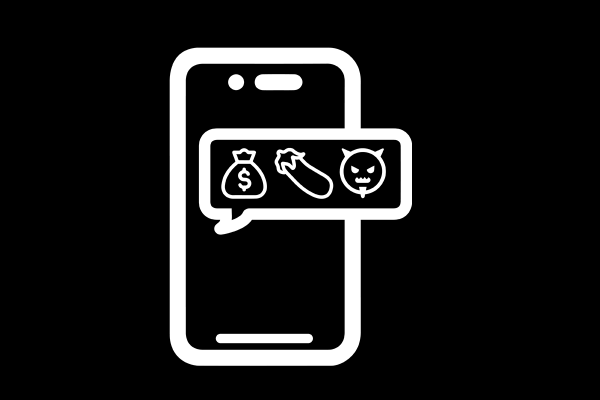Nine male students have reported being hit with a sextortion scheme in Dunedin over the course of a single week. If they didn’t pay a ransom, their nude images would be sent to their course mates at Otago University.
Police told us that there were 81 reports of sextortion across the country from December to February, almost all of which targeted young men. And that’s just reported cases - Police suggested that the real number is likely higher, because people might be too embarrassed to report the crime.
We spoke with one student, Jack*, about his experience. Jack answered the phone late last week, saying that he was counting down the hours until 3pm that day. That was his deadline. After 3pm, he said, whoever had his images would email them to his entire FYHS course. He had three hours and four minutes remaining, and was about to go to a lab. By the time the lab wrapped up, he said, “We’ll see what’s happened.”
Jack had never sent nudes before. He told us that this was the first time, and it was only because he’d just been talking with a mate “who sends them all the time”, and who had reassured Jack that there wasn’t anything to worry about. As luck would have it, he was hit up soon after by a girl that seemed keen to chat.
Critic Te Ārohi understands that all nine men have been victims of the same scam. Contacted via WhatsApp or Snapchat, all nine came into contact with an unknown user who was posing as a seemingly-normal girl. They’d exchange a few messages before being convinced to start swapping nude or otherwise intimate images, which really isn’t all that uncommon in this generation. Jack said they went back and forth, with the “girl” pushing him to include his face “which I did, which wasn’t great.” When he said it was time to go, the user sent him screenshots and screen recordings of their chat and told him to pay up, or else.
“I might not be a religious guy,” said Jack, “but I know that those that take advantage of the disadvantaged aren't gonna end up in a great place after death.”
Jack was told to pay several hundred dollars, which is when he requested the user’s bank account details. He promptly sent those numbers to police, who advised others caught in this scheme to do the same. This method has already turned up one sextortionist in Dunedin: reportedly a 15-year-old local boy, who had had this scam run on him before turning it on others.
When they don’t ask for bank transfers, the scammers usually demand pre-loaded gift cards. But however they want their money, the users tell their victims that if they don’t pay up, the images will be released online to their families, friends or colleagues; whichever creates the most anxiety. Police told us that even when the money was paid, “they often post images anyway.” Jack chose not to pay.
And his gamble seems to have worked: as of the morning of Thursday, 16 March, Jack said that he’s cut contact with the scammer. It doesn’t look like his images have been posted anywhere or sent to anyone, “and I don’t see any reason why they would going forward.” Probably a smart call by the scammer, since this would be a class three offence, right up there with aggravated assault, threatening to kill, or your third DUI. “These crimes are serious,” said a representative from the Police.
Not everyone’s story ends like Jack’s. Out of the 81 reported cases in the last few months (and remember, that’s just the reported ones), the majority have been young men. Often, the images are released even with payment. As online presence grows, so too does online harm. According to Netsafe, sextortion reports are up 20% in the last year alone. A representative from Netsafe told us that both their report statistics and police’s indicate that young men and boys between 16-20 are the main targets of these scams, members of a generation who spend more time than anyone else online. They’re the most familiar with this environment, and yet they’re still being hit the hardest.
Netsafe can help in these situations. They’re what’s called a “trusted flagger”, meaning that when they report image abuse on social media, their reports go straight to the top of the queue. A normal report has to wait in line, but theirs usually get dealt with in a few days, tops. And they double-, triple-stressed that they weren’t here to judge. “We’ve seen it all,” they said.
“This is a generation who aren’t naïve to online harms,” said a representative from Netsafe. “[They] are growing up in an era when meeting partners online first is more normal than it ever was, exchanging nude photos is a more common part of dating rituals, and scams in general are rising at a rapid rate… It’s a recipe for potential harm.” Those harms fall on the shoulders of people like Jack, who said he knew at least one other person that this had happened to. “People don’t realise that there’s someone behind the image,” he said.
Police, Netsafe and students we spoke to all repeated the same message: that it is not the victim's fault. Alex, a second-year, told us that “if you want to send nudes that’s, like, your right.”
Rick Bourne, Investigation Support Supervisor at the Southern District Police Headquarters, said that “It’s important that victims understand that they have done nothing wrong and that it is not their fault. They should receive no blame whatsoever.” He insisted that victim support for these types of activities is “always offered and available”.
“Police encourage all victims to report their cases to police by 105 online or in cases of emergency should the victim really feel frightened and scared of some immediate action against them, they should ring 111.”
*Name changed.






